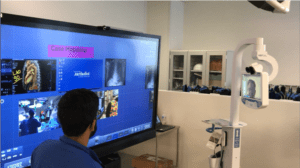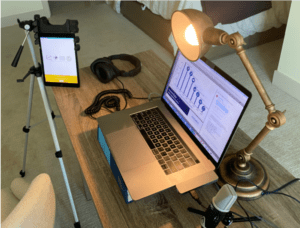
The meeting, the seminar and the symposium: Collectively, this triumvirate of forum types forms one of the core elements of postgraduate medical education. These crucial arenas in which we get together with colleagues to present data and share experiences vary between local, regional and large international gatherings. For many, great advantage is perceived from this kind of collective education process. Without doubt, major benefits are derived from receiving information delivered by our field’s experts alongside the to-and-fro discussion that occurs when we meet directly with our colleagues.
Yet, for some time now we have been starting to question whether this traditional form of education can survive some of the pressures now being applied. While largely financial up to this point, the latest threat comes from the travel restrictions being applied in the wake of the novel coronavirus outbreak.
The emerging philosophy gaining currency says that travel is not necessary when the reality of a meeting might be that attendees are simply placed in a seat to be given a talk. Of course, this is a lecture that can be delivered remotely through a variety of electronic media. On the other hand, the expense of travel can be justified when a technical skill is under instruction, or where the educator maximizes the amount of direct interaction with faculty.
We are all highly aware of the increasing financial challenges that limit participation, particularly expensive international travel. Medical device companies can no longer fund many of the international flights that have in the past brought attendees to the larger meetings. Hospitals and universities increasingly are questioning how funds are being used, the real educational value in funding such trips and concerns regarding conflicts of interest. These are the background sources of pressure we have all experienced.
Now, along comes the coronavirus to compound matters.

While we all watched the emergence of the disease in Wuhan province, central China, and its spread across the country and beyond, until recently here in the Western Hemisphere we had been minimally affected or infected. Not now, of course. Regardless, in the case of such an outbreak in this part of the world, we all have colleagues in China—and there are some major cardiovascular meetings in the Asian behemoth. In addition, many of our industry partners have manufacturing plants, distributors and customers suffering disruption amid the outbreak. Now the same measures that had been applied to travel involving China are in place in the U.S. and in Europe. The bottom line is this: Educational interaction with China—and increasingly Japan and South Korea, too— will be drastically curbed.
And what of Europe? Just before the coronavirus enveloped the continent, I visited Rome to watch an international rugby game between Italy and Scotland. I arrived on a Friday morning to learn of a small number of cases in Northern Italy, none of which was in the Italian capital. I attended the match in Rome’s Olympic stadium along with another 53,000 fans. After three days, the number of cases had skyrocketed close to 300—though still none of them in Rome. Italy was designated a Level 2 risk country by the Centers for Disease Control and Prevention (CDC) at that point in time (it has since risen to Level 3). Then, on the morning of my return to work, our hospital banned all professional travel to Italy, strongly discouraged personal travel and, furthermore, thought that since I was in a stadium, I should not come to the hospital.

Whereupon panic set. The reason? I was set to run a symposium—the inaugural DeBakey CV Congress: Advanced Interventional Cardiovascular Imaging and Robotics (Feb. 26–27)—over the course of the following two days. How could I possibly participate? Additionally, we had recently planned for four surgeons from Singapore to visit and watch our colorectal group perform robotic surgery. But the call was made. Attendance at the hospital would not be permitted. Of course, as we have seen since, this is only the beginning as the virus continues to spread, particularly now that it has crippled life and economic activity in our own backyard.
There was, however, a silver lining to these difficulties. In both of the situations outlined, the educational experience was salvaged using remote surgical viewing and remote delivery of a lecture. This, we have always believed—and now even more strongly—is the future delivery platform for medical education. Building out these capabilities is critical for the future of our profession. The coronavirus pandemic will accelerate this direction massively.
Alan Lumsden, MD, is the medical director of Houston Methodist DeBakey Heart & Vascular Center in Houston.












